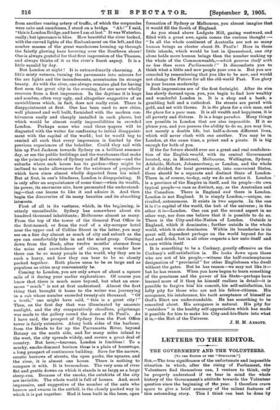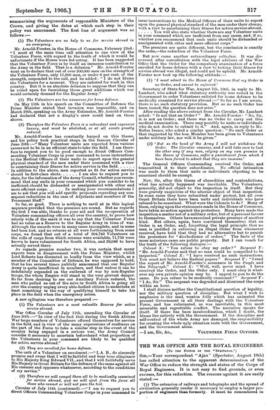THE GOVERNMENT AND THE VOLUNTEERS.
[TO TRE EDITOR Of THE "SPECTATOR"]
SIR,—The true significance of the unfortunate and impossible situation in which, after the rising - of Parliament, the Volunteers find themselves can, I venture to think, only be properly understood if we bear in mind the whole history of the Government's attitude towards the Volunteer question since the beginning of the year. I therefore crave apace to give a brief summary of the salient features of this astounding story. This I think can best be done by
summarising the arguments of responsible Ministers of the Crown, and giving the dates at which each step in their policy was announced. The first line of argument was as follows :-
(1) The Volunteers are no help to us for service abroad in an emergency. Mr. Arnold-Forster, in the House of Commons, February 23rd:
"I must at the same time call attention to one view of the Volunteer Force, with regard to the truth of which it would be unfortunate if the House were led astray. It has been suggested that the Volunteer Force is by itself an immense contribution to the Army in the field. That is a delusion." Mr. Arnold-Forster went on to declare that out of over 200,000 men on the strength of the Volunteer Force, only 11,000 men, or under 6 per cent. of the strength, responded to the call, and he added : "I do not blame the Volunteers for a moment. They are enlisted for work in this country. But it is an absolute delusion to suppose that they can be relied upon for furnishing those great additions which war would certainly demand for the Regular Army."
(2) The Volunteers are too numerous for home defence.
On May 11th in his speech on the Committee of Defence the Prime Minister stated that invasion was impossible, and on March 28th, speaking on the Army Estimates, Mr. Arnold-Forster had declared that not a dinghy's crew could land on these shores.
(3) Therefore the Volunteer Force is a redundant and expensive luxury, and must be abolished, or at all events greatly reduced.
Mr. Arnold-Forster has constantly harped on this theme, and his policy took practical shape in the famous Circular of June 20th :—" Many Volunteer units are reported from various causes not to be in an efficient state to take the field. I am there- fore to request you to be good enough to direct Officers Com- manding Volunteer Corps in your command to issue instructions to the Medical Officers of their units to report upon the general physical standard of the men undet: their command with a view to ascertaining their fitness for active service in the field In addition to the above, men reported as fit for active service • should be first-class shots I am also to request you to state, for the information of the Army Council, whether you recom- mend that any units in your command which you consider to be inefficient should be disbanded or amalgamated with other and more efficient corps In making your recommendations I am to ask that you will add specific proposals regarding any con- sequent reductions in the case of Adjutants and members of the Permanent Staff."
So far, so good. There is nothing to cavil at in this logical sequence provided that the premises are sound. But as regards the first I was able, thanks to your aid and the co-operation of Volunteer commanding officers all over the country, to prove how utterly wide of the mark it was to say that the Volunteer Force had no value as a Reserve to the Regular Army in time of war. Although the records were in many cases incomplete, and in some had been lost, and no returns at all were forthcoming from some corps, we found that out of a total of 204,743 Volunteers on the rolls of corps from vihich returns were available, 71,758 were known to have volunteered for South Africa, and 29,049 to have actually served there.
As regards premise number two, it was certain that many experts were in disagreement with the Prime Minister, whilst Lord Roberts has dissented so loudly from the view which, as a member of the Committee of Defence, he was supposed to hold, that he has several times publicly announced that our Regular Army is quite insufficient in numbers, and that unless it can be indefinitely expanded on the outbreak of war by non-Regular troops, the whole Empire will stand in the very gravest danger. So far from desiring to see our Auxiliary Forces reduced, the man who pulled us out of the mire in 'South Africa is going all over the country urging every able-bodied citizen to undertake at least something in the way of qualifying himself to take his place in the field when the emergency arises.
A new syllogism was therefore prepared :—
(1) The Volunteers are a most valuable Reserve for active service abroad.
War Office Circular of July 11th, amending the Circular of June 20th :—" In view of the fact that during the South African War-large numbers of Volunteers offered themselves for service in the field, and in view of the many expressions of readiness on the part of the Force to take a similar step in the event of the country being engaged in a serious war, the Army Council consider it necessary to ascertain beforehand what proportion of the Volunteers in your command are likely to be qualified for active service abroad."
(2) They are enrolled for home defence.
The oath of a Volunteer on enrolment :—" L A. B., do sincerely promise and swear that I will be faithful and bear true allegiance to His Majesty King Edward VII., and that I will faithfully serve His Majesty in Great Britain for the defence of the same against all His enemies and opposers whatsoever, according to the conditions of my service."
(3) Therefore we will compel them all to be medically examined for service abroad, and we will eject from the force all those who cannot or iviit not pass the test.
Circular of July. 11th (continued) :—" I am to request you to direct Officers Commanding Volunteer Corps in your command to issue instructions to the Medical Officers of their units to report - upon the general physical standard of the men under their charge, with a view to ascertaining their fitness for active service abroad. You will also state whether there are any Volunteer units in your command which are inefficient from any cause, and, if so, whether you recommend that such units should be disbanded or amalgamated with other and more efficient corps."
The premises are quite different, but the conclusion is exactly the same,—the reduction of the Volunteer Force.
But now came another extraordinary volte-face. It was dis- covered after consultation with the legal advisers of the War Office that the Order for the compulsory examination of a force enrolled for home defence with a view to testing their fitness for service abroad was illegal, and could not be upheld. Mr. Arnold- Forster now took up the following attitude :— (1) must admit in the House of Commons that my Order is no Order, and cannot be enforced.'
Secretary of State for War, August 7th, 1905, in reply to Mr. Lambert, who asked what statuary authority was vested in the Government to order Volunteers enlisted for home defence to be medically examined for service abroad :—" So far as I am aware, there is no such statutory provision. But as no such Order has been issued, the question does not arise."
After reading the above extract from the Circular, Mr. Lambert asked: "Is not that an Order ? " Mr. Arnold-Forster : "No, Sir, it is not an Order; and there was no Order to carry out this medical examination. There may possibly be units or individuals who do not desire to submit to it.' And, again, in reply to Mr. Rufus Isaacs, who asked a similar question : "No such Order as that suggested by the hon. Member has been given to Volunteers under military law, nor will it be given."
(2) But as the head of the Army I will not withdraw the Order. The Circular remains, and I will take care to look the other way if any men, relying on my own promise in the House of Commons, suffer a punishment from which, I have been forced to admit that they are immune.'
The General Officers Commanding received the Order, and transmitted it to their subordinates. No official intimation was made to them that units or individuals objecting to be examined should be exempt.
Now, Sir, after this tissue of absurdities and contradictions, what has actually happened was inevitable. The Volunteers, generally, did not object to the inspection in itself. But they were gravely suspicious of the ulterior object of that inspection. In some cases they have submitted under protest, but all over Great Britain there have been units and individuals who have refused to be examined. What were the Colonels to do ? Many of them, relying upon the statements made in the House of Commons, have taken no action against the protesters. Many have made the inspection a matter not of a military order, but of a personal favour to themselves. Others have exercised private pressure of another kind. But others, again, have convinced themselves that an Order is an Order, and, forgetting the legal principle that no man is justified in enforcing an illegal Order from whomever received, have held that they had no alternative but to punish the protesters for "disobedience of orders." The facts of the more notorious cases are public property. But I can vouch for the truth of the following dialogue :— Colonel X: "You refuse to obey my order ? " Sergeant Y: "Mr. Arnold-Forster said that no man could be compelled to be inspected." Colonel X: "I have received no such instructions. You must not believe the Radical papers." Sergeant Y: "I read the report of Mr. Arnold-Forster's assurance in the People and the Telegraph." Colonel X: "Well, well, never mind. I have received the Order, and the Order only. I must obey it what- ever my own private opinion may be. I appeal to you to do the same. Do you ref use to be medically examined ?" Sergeant Y: "I do, Sir." The sergeant was degraded and dismissed the corps within an hour.
I shall discuss neither the Constitutional question of legality, nor the military question of discipline. But what I wish to emphasise is the mad, wanton folly which has animated the present Government in all their dealings with the Volunteer Force, and has culminated, as was inevitable, in this most miserable and regrettable conflict. The narrative speaks for itself. If there has been insubordination, which I doubt, the blame lies entirely with the Government. If the discipline and self-control of the whole Army are damaged, the responsibility for creating the whole ugly situation rests with the Government, and the Government alone.
—I am, Sir, &c., VOLUNTEER FIELD OFFICER.



































 Previous page
Previous page